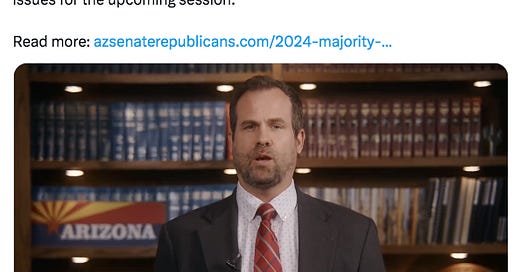The Daily Agenda: C’mon, lawmakers. You can do it!
A new year means another chance to do it right … State lawmakers should seize it … Getting creative on I-19.
With New Year’s Day still fresh in our minds and the Arizona legislative session kicking off next Monday, today is a fitting moment to tell lawmakers what we think their New Year’s resolutions should be.
As reporters, we tend to focus on making sure the public knows what officials are up to. So that’s where we’ll start.
Resolution 1: Be as transparent as possible
Don’t delete public records. Lawmakers should undo the policy that allows them to delete text messages as soon as they get them and emails after 90 days. GOP lawmakers put that policy in place at the start of last year’s legislative session. It was a giant slap in the face to the public and came shortly after their texts and emails revealed their role in the “audit” of the 2020 election results.
Make campaign finance deadlines match how people vote. A key deadline for candidates to tell voters who funded their campaigns comes after a ton of people already mailed in their ballots. In Tucson’s primary election last year, nearly half the votes were tallied before candidates told voters who funded the bulk of their campaigns. Switching a few words in state law could do the trick.
Let us “See the Money.” While we’re talking about campaign finance, state officials need to do what they promised years ago and build a comprehensive database so the public can easily search for candidates at all levels of government and find out who’s funding them.
Address the public’s concerns. The school voucher program is highly controversial, but you’d never know it by reading the state’s quarterly reports. The reports don’t address widespread concerns that the program could bankrupt the public education system. An executive summary that says, “This many students shifted from public schools to private schools and cost this many dollars. See page 8 for a breakdown by school district” would be a good start.
Resolution 2: Stay focused on what matters
Don’t spend all your time on the culture wars. Lawmakers are introducing bills for the upcoming legislative session and we’re already seeing culture war issues popping up all over the place. Those are debates worth having, to a certain extent. But they tend to take up all the oxygen in the room. On the plus side, one of the state’s most pressing long-term issues, groundwater regulation, is the subject of about two dozen bills already.
Resolution 3: Don’t balance the state budget on cities’ backs
Legislators are in charge of the state budget. They should be the ones to fix it. They’re now projecting a shortfall of hundreds of millions of dollars for this fiscal year and the upcoming one. When lawmakers see a deficit, they start looking at cities and counties. After the Great Recession suffocated the economy, they cut funding for all sorts of local things, like roads and schools. Now they’re talking about delaying road projects. Who knows what else they’ll come up with. Local officials aren’t the ones who passed huge tax cuts or installed a $900 million school voucher program. They shouldn’t be the ones forced to fix the deficit.
The funding battle between local governments and the state Legislature will be one of the big debates over the next few months, so get ready to hear a lot about it.
And remember, you don’t have to sit on the sidelines. Legislators are regular people, same as you. They are surprisingly accessible and ready to hear from their constituents.
Like we said yesterday when we wrote about resolutions for local officials, there are easy ways to make your voice heard. The simplest ones are writing a letter to the editor (email Curt at curt@tucsonagenda.com) or contacting your state representatives or senators.
Not a rosy outlook: While 2023 was a banner water year, the Colorado River basin is still in trouble, the Arizona Daily Star’s Tony Davis reports. Approved and planned conservation efforts will likely keep water demand below normal, but the river’s supply forecast isn’t great and it’s too early to know how it will turn out. The projections for 2024 show spring and summer runoff well below normal and for the October 2023 through September 2024 period known as the “water year,” runoff into Lake Powell is now forecast to be 79% of normal levels.
Taking responsibility: Nogales Mayor Jorge Maldonado asked Gov. Katie Hobbs earlier this month to continue to lobby for federal funding to make sure migrants who are processed and released by U.S. Customs and Border Protection have transportation from the city to their next destination, the Nogales International’s Daisy Zavala Magaña writes. But the city doesn’t plan to apply for federal grants to assist with releases. City Manager Roy Bermudez said federal grants often come with complicated reporting requirements and that city leaders consider the situation to be a federal responsibility rather than a local issue.
A more affordable option: The number of Americans crossing the border to Mexico for IVF treatments is increasing, with procedures in Mexico costing only a fraction of those in the United States, Cronkite News’ Roxanne De La Rosa reports. One doctor in Mexicali said his clinic serves roughly 1,000 families a year and about 40% of his patients are American, traveling from as far away as Georgia and Washington to seek treatment. At the Dr. Cigüeña clinic, each round of IVF costs between $4,000 and $6,000. In the U.S., one round of IVF costs around $23,474, according to FertilityIQ, with only about 25% of health care plans covering fertility treatment.
Filling a need: Santa Cruz County resident Dianna Holman launched her own transit system, Rio Rico Rides, last month, a 13-seater minibus that travels between Nogales and Rio Rico, helping to fill a gap in reliable transportation along I-19, the NI’s Angela Gervasi writes. Nogales is home to a handful of small public transit routes, including the city-funded Nogales Rides, which provides transportation to senior citizens and people with special needs, and other private bus companies that offer routes to popular locations, including Walmart and Food City.
Two-pronged approach: South Tucson’s Casa Maria soup kitchen is working to combat Arizona’s massive food waste problem while also helping to feed community members in need, with grocery stores donating food that would otherwise end up in the garbage, the Arizona Luminaria’s Teressa Enriquez reports. A 2022 study showed that Arizona wasted more food than any other state in the nation, discarding $9.5 billion in produce and other foodstuff. Keeping food out of the trash helps cut down on landfill methane emissions, which is 28 times more potent than carbon dioxide.
Helping families: Local nonprofit More than a Bed helps provide essential items for children in foster, kinship and adoptive homes, helping to decrease the financial hardship on caregivers and helping the needs of each child are met, Inside Tucson Business’ Hayden Dobb writes. The organization has a store where people can shop for donated items and also organizes public events for families. In 2022, the group provided 2,777 children in foster care with items including beds, shoes, clothes, toys and baby supplies.
The next meeting of Caitlin’s solutions-focused community book club (a partnership with the Community Foundation of Southern Arizona and Tucson Tome Gnome) is just three weeks away. We’ll be discussing Jojo Moyes’ "The Giver of Stars” on Jan. 24. Refreshments will be served and the event is free, but you need to RSVP in advance.









2024 will be the most important election event of my lifetime. Please consider volunteering. Give your local Democratic Party Office a call. The have needs that you may be able to contribute help with. Like the man (or woman?) said..."all politics is local".